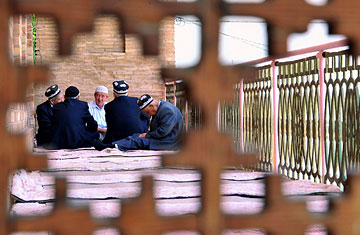
Kyrgyz men converse at a Mosque in central Osh, Kyrgyzstan's second largest city, on May 15, 2009
While much of the focus of the U.S.-led war on terror now surrounds that theater of operations the Obama administration terms "Af-Pak," the post-Soviet 'Stans to the north present their own strategic quagmire. The tactical support of governments in the region is becoming increasingly vital for U.S. plans to bring stability to Afghanistan. Central Asian countries also sit atop a significant chunk of the world's untapped oil and natural gas reserves, assets that are eyed covetously by both neighboring Russia and China, as well as the West. Yet the region — dominated by corrupt and repressive regimes — is itself precariously poised, home to its own native Islamist insurgencies vulnerable to domestic upheaval. "There is the possibility for really unpredictable change," says Jeffrey Mankoff, a fellow for Russian studies at the Council on Foreign Relations in New York. And it's change few Central Asia watchers expect to be positive. While great powers vie for resources and influence, countries that were once seen as a bulwark against more turbulent nations to the south and west are themselves lurching toward crisis.
Still, Central Asia exists on the periphery for most policy makers in the U.S. When not the illusory realm of Borat or an exotic waypoint of horse markets and mutton skewers, the region has been cast off as a dysfunctional Russian annex, easily manipulated by a Kremlin that still views these young republics as satellite states. From Ashgabat to Astana, the ruling elites are all holdovers from the Soviet era, and sometimes more fluent in Russian than their national tongues. "Their regimes operate," says Eric McGlinchey, a Central Asia specialist and professor of politics and government at George Mason University, "along almost pathological networks of patronage" — and ones that Moscow knows how to navigate. That close working relationship has been on full display recently in Kyrgyzstan: spurred by a Russian promise of $2 billion in aid, the Kyrgyz government signaled its intent to shut down the U.S.'s pivotal Manas air base there in January, and reaffirmed that pledge this week despite recent overtures from the Obama administration.
Russia may be keen to deter an entrenched American presence in its traditional sphere of influence, but is more muted about China's expanding role in the region. Resource-hungry Beijing has steadily made inroads west, tying up lucrative energy contracts in Kazakhstan, while committing tens of million dollars to infrastructure and hydropower projects in impoverished Kyrgyzstan and Tajikistan. China has also become the single largest investor in Afghanistan, building roads through Kabul and setting up a massive $3 billion copper mine. In 2001, China formed the Shanghai Cooperation Organization (SCO), a geo-political grouping aimed at improving economic and political relations with Russia and other Central Asian nations — as well as a vehicle for Beijing to quash support for separatists in its restive Xinjiang province, whose Muslim Uighurs share ethnic ties with Central Asia's Turkic populations. The SCO also declared in 2005 that there must be a timeline for withdrawing all U.S. military bases in Central Asia, a clear sign of Beijing and Moscow's intent to limit U.S. influence. The organization convened most recently this week in Yekaterinburg, Russia, where China proffered a $10 billion soft loan to tithe over the region's ailing economies and all spoke of enhanced political and economic cooperation. "Russia and China are both interested in maintaining the status quo," says Sean Roberts, a Central Asia expert at George Washington University.
